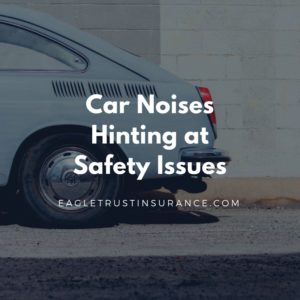 We all experience the occasional random noise when driving our cars. Whether it’s a kicked-up pebble hitting our windshield, the dreaded thud running over a pothole, or a clanging in the wheel well after driving over debris in the road. But how do we know when a noise signals a real problem? Here’s a guide to help determine some car noises hinting safety issues.
We all experience the occasional random noise when driving our cars. Whether it’s a kicked-up pebble hitting our windshield, the dreaded thud running over a pothole, or a clanging in the wheel well after driving over debris in the road. But how do we know when a noise signals a real problem? Here’s a guide to help determine some car noises hinting safety issues.
Brakes Squealing, Grinding, or Growling
When any brake noises appear, you’re experiencing issues with your brake pads at various levels. Squealing indicates that the pads or shoes are wearing thin and will need to be replaced. If you hear grinding or growling – get them checked immediately – as this is a sign that they have worn down so much that metal is touching metal. This is a serious concern that not only affects your braking efficiency but can also lead to costly repairs.
Finger Snapping, Popping, or Clicking Sounds
If you hear this noise while turning your car (but not when you steer straight), the issue is related to either one or both of your constant velocity (CV) joints on your front axle. Be particularly aware of this if you drive a front-wheel or all-wheel drive vehicle. This sound may mean that you will need a new front axle (and the car is unsafe to drive in this condition.)
Rhythmic Squeaking or Clunking
If you have a rear-wheel or four-wheel drive vehicle and hear a rhythmic squeaking that intensifies when you accelerate, you may have a problem with the universal join (U-joint) – which is part of the driveshaft. This is an immediate cause for concern! Get to a mechanic as soon as possible.
Rhythmic Clunking on the other hand suggests a different issue – but it is just as problematic. Any sort of clunking, banging, or tapping sound emanating from under the hood hints at trouble with valves, connecting rods, or pistons. This, too, is another red flag and a reason to bring your car to a mechanic right away.
Rattling Sound Like Coins in a Dryer
You’re more likely to notice this sound when driving at lower speeds (and it may even stop when you are driving faster). The culprit, in this case, may be a loose lug nut rattling around inside the hub cap – probably caused by an insufficient tightening of the wheel. Don’t wait to have this addressed.
Squealing Under the Hood
If you notice this happening when starting up your car (or while accelerating), it indicates a problem with a worn or loose belt. Depending on the age of your car, it may point to different belts. In a newer vehicle, it could be the serpentine belt that drives multiple components at the same time (and is easier and cheaper to fix). In older cars, it could be related to the power steering pump, alternator, or air conditioning compressor and may be a more expensive repair.
Summary of Car Noises Hinting Safety Issues
More often than not, if you’re hearing recurring noises coming from your vehicle, it’s probably not a good sign and should be addressed as soon as possible. Better to err on the side of caution when it comes to car noises hinting safety issues than to wait until it’s too late. It’s the best way to protect your safety and your wallet!


